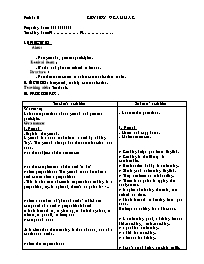Bài soạn môn học Tiếng Anh 11 - Period: 6 Review grammar

I. OBJECTIVES
Aims:
- Use gerunds, present participles.
Lexical items:
- Words and phrases related to lesson.
Structure:
- Use these structures to solve communicative tasks.
II. Method: Integrated, mainly communication.
Teaching aids: Textbook.
III. Procedures.
Bạn đang xem tài liệu "Bài soạn môn học Tiếng Anh 11 - Period: 6 Review grammar", để tải tài liệu gốc về máy bạn click vào nút DOWNLOAD ở trên
Period: 6 REVIEW GRAMMAR Preparing date: 20/ 10/ 2007 Teaching date:B2B4.. I. OBJECTIVES Aims: - Use gerunds, present participles. Lexical items: - Words and phrases related to lesson. Structure: - Use these structures to solve communicative tasks. II. Method: Integrated, mainly communication. Teaching aids: Textbook. III. Procedures. Teacher’s activities Students’ activities Warm-up Ask some questions about gerund and present participle. Grammar 1. Gerund - Explain the gerund. A gerund is a noun made from a verb by adding ‘ing’. The gerund always has the same function as a noun. + as the subject of the sentence: + as the complement of the verb ‘to be’ + after prepositions: The gerund must be when a verb comes after a preposition: - This is also true of certain expressions ending in a preposition, eg. in spite of, there’s no point in.. + after a number of ‘phrasal verbs’ which are composed of a verb + preposition/adverb to look forward to, to give up, to be for/ against, to take to, to put off, to keep on: + compound noun -It is clear that the meaning is that of noun, not of a continuous verbs. + after the expressions: can’t help, can’t stand, it’s no use/good and adjective worth: - Answer the questions. 1. Gerund - Listen and copy down. - Make sentences. + Reading helps you learn English. + Reading in the library is comfortable. + Her favorite hobby is swimming. + She is good at learning English. + They are keen on windsurfing. + There is no point in typing the assignment. + In spite of missing the train, we arrived on time. + I look forward to hearing from you soon. He kept on asking for a discount. + A swimming pool, a driving lesson bird-watching, train-watching. + a pool for swimming. + a birb for watching. + a lesson for driving. + I can’t stand being stuck in traffic jams. + It’s no use/ good trying to presuade him. + It might be worth changing the title of the book. Present participle: The present participle of most verbs has the form V+ing and is used in the following ways. + as part of the continuous form of a verb: + after verbs of movement/position in the parttern: verb + present participle go diving, go fishing, go swimming + after verbs of percenption in the pattern: verb + object + present participle: + as an adjective + with the verbs spend and waste, in the pattern: verb + time/money expression + present participle. + with verbs catch and find: verb + object + present participle. + to replace a sentences or part of a sentences Homework - Asks Ss to review grammar and put sentences. - Asks Ss to prepare the new lesson. Present participle: + I am working + she was dancing +my mother used to go shopping everyday. + he came running towards me. + I hear someone playing the guitar. + I can smell something burning. + It was an interesting film. + It’s a bit worrying when the police stop you. + I spend two hours a day travelling to work. + don’t waste time playing that games. + If I catch you stealing my apples again, I’ll tell your parents. + we found our dog lying in the bathroom. + they found their mother sitting in the garden. + he sang to himself. He walked down the road. Singing to himself, he walked down the road. - Review grammar and put sentences. - Prepare the new lesson.
Tài liệu đính kèm:
 REVIEW GRAMMAR 6.doc
REVIEW GRAMMAR 6.doc





